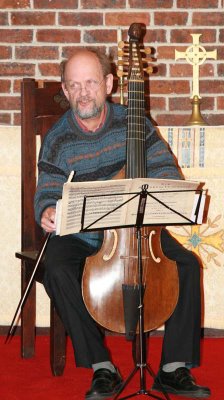 (b Dilbeek, nr Brussels, 31 Aug 1938). Viola da gamba player and cellist. Members of the family were musicians on both sides, connected with brass bands. Wieland left school at 15 and began musical studies (cello and piano) at the conservatory at Bruges, where the family had moved in 1952. He also studied at the Brussels Conservatory (1957–62; prix d’excellence, 1962). At 18 he began teaching himself the viol. He played in the Brussels avant-garde group Musiques Nouvelles (1962) and, from 1959 to 1972, in the Alarius Ensemble, a group specializing in Baroque music, especially French. After that he played with his brothers in the Kuijken Early Music Group and was much involved in teaching; he has held appointments at the conservatories of Antwerp, Brussels and The Hague since the early 1970s and has conducted many masterclasses. He has appeared frequently at festivals, such as Flanders, Saintes and the English Bach Festival, and toured in Australia and New Zealand with his brothers and Gustav Leonhardt. Artists with whom he has played include Alfred Deller, Gustav Leonhardt and Frans Brüggen.
(b Dilbeek, nr Brussels, 31 Aug 1938). Viola da gamba player and cellist. Members of the family were musicians on both sides, connected with brass bands. Wieland left school at 15 and began musical studies (cello and piano) at the conservatory at Bruges, where the family had moved in 1952. He also studied at the Brussels Conservatory (1957–62; prix d’excellence, 1962). At 18 he began teaching himself the viol. He played in the Brussels avant-garde group Musiques Nouvelles (1962) and, from 1959 to 1972, in the Alarius Ensemble, a group specializing in Baroque music, especially French. After that he played with his brothers in the Kuijken Early Music Group and was much involved in teaching; he has held appointments at the conservatories of Antwerp, Brussels and The Hague since the early 1970s and has conducted many masterclasses. He has appeared frequently at festivals, such as Flanders, Saintes and the English Bach Festival, and toured in Australia and New Zealand with his brothers and Gustav Leonhardt. Artists with whom he has played include Alfred Deller, Gustav Leonhardt and Frans Brüggen.In the late 1970s Wieland Kuijken came to be regarded as the leading exponent of the bass viol, both as a continuo player, in a wide repertory of French, German, Italian and English music, and as a soloist, in Bach and particularly in the French repertory, notably Marais and Forqueray; he has also played in chamber music of the Classical period, including Mozart and Boccherini. His playing combines care over scholarly detail with a high level of musicianship; it is characterized by its tonal purity, its sense of line, its poise and restraint, and by its seriousness of approach.
J. A. Sadie: 'Kuijken, Wieland’, Grove Music Online ed. L. Macy (Accessed 8 November 2006),
It was only a little more than a month ago that I was asked to accompany Wieland and Eva Legene on the theorbo in concert (Wieland requested to borrow my viol as he did not bring his from Europe). However, I was urgently summoned back to Asia due to more pressing matters. This is a picture of my viol in Wieland's during the solo recital he did instead:

It seems he was equipped with his own bow, perhaps one of the Patignys that he seems to favour. I know, I can't stand my own bow either!